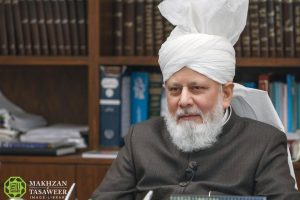
Farrukh Tahir, Canada
There are some leaders for whom the phrase ‘born to be a leader’ prove to be quite apt, as they exhibit qualities of leadership from their very childhood and with time and the polishing of these qualities, they become able to take charge and pave the path to success. As for Hazrat Mirza Bashirudin Mahmud Ahmad (ra), he was born to lead in the sense that as his life progressed, it became clear that he was indeed the manifestation of the prophecy regarding the Promised Son vouchsafed to his father, the Promised Messiah (as). God foretold that he would render great services to Islam, and as a grand fulfilment of this, he went on to be divinely appointed as the leader of a divine community when he became the Second Caliph of the Ahmadiyya Muslim Community. Upon looking back at his life’s history, it becomes evidently clear that with the guiding hand of God, even in the face of adversity due to his frail health, he was developing certain qualities from his early years which would ultimately take him to being a great leader of a divine community.
Perhaps most salient of all these qualities was his conviction in the existence of God; after all he himself would become the clear fulfilment of a grand prophecy vouchsafed to his father, the Promised Messiah (as) about the Promised Son. As such it was God Himself who granted him experiences in his early years which would not only establish his certainty in God, but would become the foundational basis for everything he achieved and the leader he would ultimately become. Whilst relating an incident from his childhood which lead him to attaining certainty in the existence of God and the truth of Islam, the Second Caliph (ra) states:
‘I was 11 years old when Allah the Almighty, through His grace, enabled me to transform my belief into conviction.
It was the time after Maghrib [early evening] prayers and I was standing in my home. Suddenly, a thought occurred to me and I began to ponder as to whether I was an Ahmadi simply because my father was the founder of the Ahmadiyya community, or because I found Ahmadiyyat to be true and that it had been established by God Almighty. After this thought occurred to me, I decided that I would think hard about it and not leave my place until I reached a conclusion. If I realised that Ahmadiyyat was false, then instead of going to my room, I would depart from the courtyard. Nonetheless, after making this decision, I started to contemplate, and naturally, certain proofs occurred to me that I began to analyse. I would formulate an argument and then refute it, and then formulate a second argument, and refute it, and then formulate a third argument, and refute it as well. This continued to the extent that I began to ponder over whether the Holy Prophet (sa) was a true prophet of God and whether I believed him to be true because my parents believe in him, or because I believed that he was a righteous prophet through evidence. When this question posed itself to me, I decided that I would reach a conclusion in this matter as well. After this, a thought naturally occurred to me about God Almighty which needed to be resolved, and I questioned in my heart as to whether I simply held the belief in God Almighty, or had I truly uncovered the truth that this world has a God. Then, I began to contemplate over this question about Allah the Almighty. My heart said that if there is a God, then the Holy Prophet (sa) must also be true, and if the Holy Prophet (sa) is a true prophet, then the Promised Messiah (as) must also be true, and if the Promised Messiah (as) is true, then Ahmadiyyat must surely be true as well. However, if this world has no God, then no one among them is true.
I had decided that today I would find a solution to this question, and if my heart reached the conclusion that there is no God, then I would no longer remain in my home. In fact, I would leave at once. After making this decision, I began to deliberate on the matter and continued to do so. As I was very young, I could not find an acceptable answer. Even so, I continued to ponder until my mind became weary.
At that moment, I looked to the sky. There were no clouds that day. The sky was crystal clear. The stars were beautifully glistening in the sky; no other sight could have been more uplifting for a tired mind. I was tired and began to gaze at the stars and enjoyed the scenery. I continued to look at them for so long that I lost track of time. After a while, when my mind was refreshed, I thought to myself that these stars are so beautiful, but is there something beyond them? My mind proposed the answer that there would be more stars beyond them. Then I thought, what is beyond that? Again, my heart proposed the answer that there are even more stars beyond that. Then, I questioned as to what would be further beyond that. My mind proposed the very same answer, that there would be even more stars beyond that. Then again, I asked myself what is even further beyond that, and again, my heart and mind proposed that there would be more stars. Finally, my heart said that it cannot be that beyond the first star, there would be a second, and after the second, there would be a third, and after the third, there would be a fourth. Will the stars not eventually end? If they did, then what would come after them? After all, it is this very question that perplexes people who wonder what it means when we say that God is limitless and has always existed, as they say, there must be some sort of limit. This same curiosity developed within me regarding the stars, and I wondered whether they ever end or not. If they do end, then what will come after them? And if the stars never end, then what is the system whereby they last forever?
When my thoughts reached this stage, I realised that it is vain to conjecture about God being limited or limitless. Even if one does not accept God, what can you say about the stars which are before your eyes? If we accept that something is limited, then it can only have a limit if something else begins after it ceases to exist. Thus, the real question is that if they are limited, then what lies beyond them? Or, if it is said that they are limitless, then if man can accept stars to be without limit, why can man not accept God Almighty to be without limit? At that moment, my heart accepted the fact that God does indeed exist, because, within the law of nature, God has brought about the same allegations which are raised against His Own existence. He says, “If you raise these same questions about Me, Who cannot be seen, then what is your response regarding those things which can be seen, because you raise the same questions about them, as you do about Me. You have no answer, yet you quite simply say that you cannot understand how God can be limitless.”’[1]
Such profound thinking, especially in an 11-year-old child, can only be the result of God’s close and loving attention toward this special child so that he may grow to not only lead a divine community, but also become an example for leaders around the world.
About the Author: Farrukh Tahir is an Imam of the Ahmadiyya Muslim Community in Canada, and member of the Existence Project Team for the Review of Religions.
ENDNOTES
[1]Khutbat-e-Mahmud, Vol. 19, pp. 689-692




Add Comment